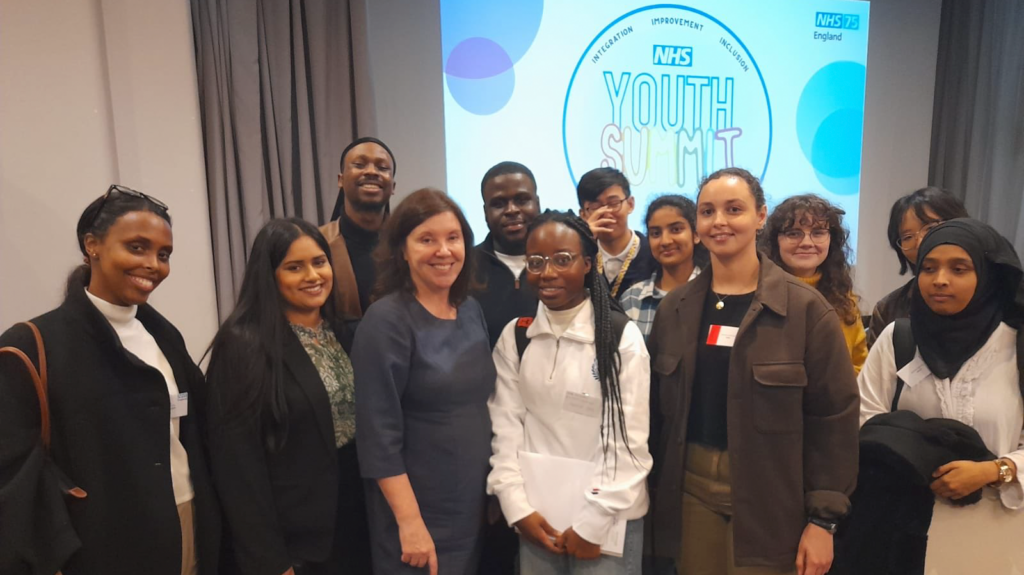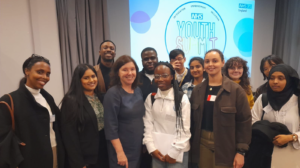
Hello, let me start by saying how delighted I am to be in a room full of people as passionate about outcomes for children and young people as I am! My name is Rachel De Souza and it is my job as the Children’s commissioner to champion the voices of children and young people.
Making sure that those making decisions listen to what children have to say. I felt – like many of us – that children had sacrificed so much during the pandemic and I wanted to make them front and centre of our post-pandemic planning. I wanted to hear from children across England about their families, their schools, their friends, their communities and their aspirations for the future. And so, in 2021, to help shape my time as children’s commissioner, I launched The Big Ask, a survey for children all over England. As who could offer more insight into the needs of children and young people than children and young people themselves!
We got over half a million responses to that survey, making it the second largest survey of children in the world coming second only to the US census. The amazing thing is across age, gender, ethnicity, family income levels, locations and vulnerability what children want is consistent – a good home life, a good education, a job, enough money, friends, to feel well and to be part of a community.
Children and young people today are a generation of thoughtful, passionate individuals who care about their communities and getting a good education. Unlike any other generation, the children of today are growing up with my unfiltered and uncensored information at their fingertips and I think this is what has ignited their passion to ensure that this world is fair and equal for everyone no matter where or what you are born. Children simply hope for a fair chance and value a society where all can success. As adults we need to make sure that this is the case.
‘Nobody is less capable than anyone […] if they have a different colour of skin […] they should be treated fairly.’ Boy, 10.
I want to take you through out findings, which have informed my 7 pillars of work, chapter by chapter.
Community
As I mentioned, this generation of children are civic-minded, social and outward-looking. They care about improving their neighbourhoods and they wanted themselves and others to be treated fairly by everyone.
After such a long period of isolation, they once again want to feel part of something larger than themselves – part of a caring community. And they want things to do – activities that are affordable, fun, sustaining and, importantly, safe. Children want safe places to play and they need a safer online world – unsurprisingly this was more important to girls, rather than boys. I have been working tirelessly with other departments, and social media platforms, exploring ways to strengthen the online safety bill so we can all work towards a safer and happier online world for children.
Health
Linked to a safer online and offline world is children’s health and wellbeing. Children told me how much they care about being happy and well. Following the lessons of the pandemic, and the toll it took on young people’s wellbeing, this is a generation newly conscious of the artificial dichotomy between mental and physical health.
And whilst most children told me they were happy, some are really struggling with their mental wellbeing – 1 in 5 children said they were unhappy with their mental health. There is particular concern with the mental health of teenage girls aged 14-17 – being nearly twice as likely than boys to be unhappy with their mental health.
Children want simple things – someone to talk to when they are worried and before things get worse. This is why I have made children’s wellbeing and access to good healthcare a priority. I am going to keep working with the Secretary of State for Health, NHS England and others across government to push for these solutions. I won’t stop until we get the changes we all want to see and our children deserve.
School
I truly believe that a great school and education is vital to unlocking opportunities in the future. And, in The Big Ask, this generation told me how much they liked school. A gruelling two years of online learning has reset the relationship between students and school. Many students couldn’t wait to get back to their friends, their teachers, their activities. Children do not want a culture of spoon-feeding or ‘learned helplessness’, in which they do not have to think. In fact, a reflective, philosophical attitude begins to emerge in the responses. They told me they found schools challenging, but fulfilling and hope, in the end, for good, rewarding jobs.
Rebalancing the education system to make it a fair and nurturing as possible was a clear priority in every facet of school life. Ensuring Children in the UK all have access to the best quality of schools possible is a huge priority for my office.
Jobs and skills
On jobs, the main things I want to hammer home is that there is no shortage of aspiration and ambition amongst England’s children – this is an ambitious generation who want to get on in life.
When I went on tour promoting the Big Ask, I met our next generation of astronauts, computer scientists, inventors and entrepreneurs. Having a good job or career was the top choice when children were asked for their priorities for the future. They want more advice and support to succeed in their chosen career. They want to know more about vocational careers and opportunities and for more opportunities to be available to all children, no matter where they live. That is true across ages and demographics.
Family
The Big Ask showed that having a loving, stable and supportive family life is extremely important to children, both now and for their future. And I truly believe that the family units we have can have transformative effects on children’s future success and outcomes. Children believe in family, not just the nuclear family but families of all kinds. They told me they wanted more help for their families when they were struggling.
The Big ask also made clear that there is a key link between happiness and family for children. While 80% of children said they are happy with their family life overall, when children are not happy with their family life they are 9 times more likely to be unhappy with their life overall.
Last year I launched part 2 of my Family Review. As part of this we spoke to families, and the services that support them. Through extensive quantitative and qualitative research, talking to thousands of families, our story of family tells a complex one. Although family composition many have changed over the last few decades, what family means to people today is shown to be remarkable consistent – this is over time and across family groups. For families, it is defined through loving and strong relationships, through practical and emotional support and through a life spent together. My report defines, for the first time, what exactly is so protective about them.
Children’s social care
Now on to children in care. One of my main responsibilities as children’s commissioner is to advocate for children in care. There are about 80,000 children in care. The equivalent of about 80 big secondary schools.
Nearly 6,000 children in care responded to The Big Ask and whilst some spoke of positive and loving experiences, others spoke of a lack of consistency and stability which was limiting their life chances.
Children in care want the same thing as all other children: to be loved, to have friends and to make plans for the future. I want this to be possible for every single child in the country. But, we are failing to give children loving, caring and stable homes; we are failing to get children into good schools which can support them, and we are failing to get children vital mental health care to help them recover from trauma. For this, strong relationships are vital. To me, this means all children are able to make at least one positive, trusting and stable relationship through which to engage the system. This could be a social worker, a teacher, a foster parent. Whoever it might be, we need to put a system in place that enables this. We owe it to all children in care, wherever they are in the country.
Better world
In The Big Ask, children told me how much they care about their peers and aspired to have a fairer, better world. Nearly 40% of children told me that ‘A healthy environment and planet’ was their biggest worry for the future, whilst 31% said that fairness in society was also a key concern.
In the face of many challenges, including a global pandemic, climate change and ongoing inequality, this generation of children and young people are ambitious, socially conscious and passionate.
I am dedicated to hearing directly from children about the issues that matter most to them. I am establishing a Children’s Advisory Board and a Care Experienced Advisory Board and will continue to look for opportunities to put children’s views about the environment and their voices at the centre of policy debates.
I want to end with a quote from The Big Ask.
When we asked children what was holding them back in England in 2021, a 16-year-old boy told us something sad:
‘The social stigma of children from lower class backgrounds trying to achieve something bigger than themselves.’
I’ll read that again. Children from lower class backgrounds trying to achieve something bigger than themselves.
We should tell him of course that there is nothing bigger than the lives of children. So – not to scorn ambition – we could try to build something equal to it.



